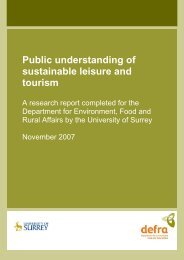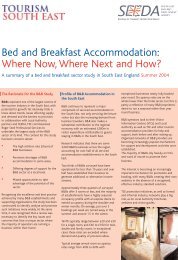Spa Business issue 2 2012 - Leisure Opportunities
Spa Business issue 2 2012 - Leisure Opportunities
Spa Business issue 2 2012 - Leisure Opportunities
Create successful ePaper yourself
Turn your PDF publications into a flip-book with our unique Google optimized e-Paper software.
One of the pioneers in this field is<br />
Cornell University’s School of Hotel<br />
Administration in the US, which introduced<br />
a spa-specific module to its<br />
hospitality management offerings as<br />
far back as 1985 (sb10/1 p52). Today,<br />
students studying for bachelor’s or<br />
master’s degrees at Cornell can choose<br />
from three semester-long spa modules<br />
taught by industry stalwart Professor<br />
Mary Tabacchi, and can also opt to do<br />
their mandatory summer-break internships<br />
in the spa industry. But it’s no longer<br />
the only university with the spa industry<br />
on its radar – other examples abound,<br />
from Florida Gulf Coast University and Arizona<br />
State University in the US, which offer<br />
degrees with a spa concentration and certificate<br />
extension respectively, to Les Roches<br />
International School of Hotel Management<br />
in Switzerland, which touches on spa more<br />
generally in their wider curriculums.<br />
So what exactly can these young graduates<br />
bring to the spa management table?<br />
“Our biggest advantage is the strong business<br />
grounding that our students have to<br />
have before we turn them over to employers,”<br />
says Tabacchi. Patel, who has recruited<br />
from Cornell, EHL and Les Roches, agrees.<br />
“These are highly educated, smart young men<br />
and women with a thorough understanding<br />
of hotel management, so we don’t need<br />
to teach them the basics of our business,”<br />
he says. “As the spa industry grows, we’re<br />
going to need more managers, and what better<br />
time to groom them than when they’re<br />
fresh from education?”<br />
Despite this, many in the spa industry feel<br />
there is a disconnect between what these<br />
courses offer and the real world of employment,<br />
with new graduates ill prepared for the<br />
day-to-day challenges of running a spa, too<br />
inexperienced for corporate roles and subsequently<br />
unsure of where they fit in. “We have<br />
a difficult time recruiting hospitality graduates<br />
who haven’t previously worked in the<br />
spa industry,” says Bjurstam. “Unlike those<br />
specialising in rooms or F&B, they have<br />
not usually had any practical experience of<br />
working in a spa. Even if they choose to do<br />
internships as part of their course, they’re<br />
typically only for two weeks, and often they<br />
don’t want to do them in a spa. They’re aiming<br />
for higher: corporate management or<br />
�������������<br />
����������������<br />
���������������<br />
Cornell, US, introduced a spa degree<br />
module over 25 years ago. Its graduates<br />
have strong business skills and are<br />
encouraged to get operational experience<br />
consultancy. But we’ll only take interns if<br />
they’ve worked in spa operations before<br />
their studies – otherwise there’s really<br />
nothing they can do for us.”<br />
Tabacchi agrees her students sometimes<br />
have unrealistic expectations. “I<br />
urge anybody interested in corporate or<br />
consulting work to get some operational<br />
experience first,” she says. “You never really<br />
get it until you’ve been in the trenches.”<br />
However, even graduates with spa manager<br />
roles in their sights often find it difficult to<br />
get their foot in the door due to their lack<br />
of practical experience. “Too often the feedback<br />
from employers is that some people<br />
think that just because they’ve got a [management]<br />
degree they should be able to walk<br />
into spa management jobs,” says Suki Kalirai,<br />
director of UK-based training provider the<br />
Carlton Institute and chair of British trade<br />
body the <strong>Spa</strong> <strong>Business</strong> Association. “But if<br />
they don’t understand day-to-day operations,<br />
that’s not always feasible.”<br />
Not everyone, however, thinks the fault lies<br />
with the universities. “I love what the universities<br />
are doing, and I’ve hired lots of people<br />
from Cornell,” says Elaine Fenard, manag-<br />
SPA BUSINESS 2 <strong>2012</strong> © Cybertrek <strong>2012</strong> Read <strong>Spa</strong> <strong>Business</strong> online spabusiness.com / digital 39

















